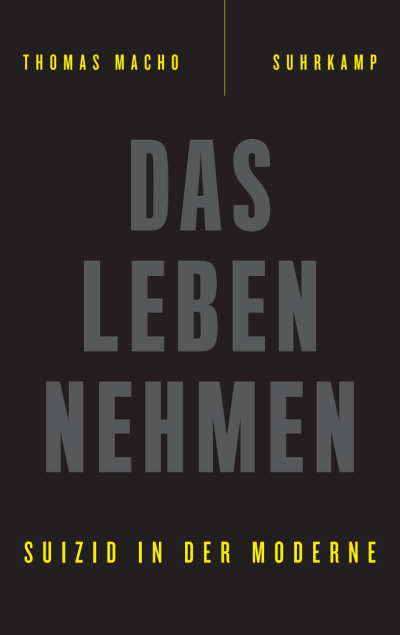Spanish world rights (Herder), Brazilian Portuguese rights (WMF Martins Fontes), Italy (Mimesis), Netherlands (ten Have)
»Suicide«, Walter Benjamin wrote in his Arcades Project, appears »as the quintessence of modernity«. And, indeed, after having been seen for centuries as a sin or the expression of psychic disturbance, in some countries even criminally sanctioned, since the 20th century there has been a profound change in how suicide is viewed and this in turn has led to the emergence of a new culture of death. More and more often one’s own death is regarded as a “project” for which he or...
»Suicide«, Walter Benjamin wrote in his Arcades Project, appears »as the quintessence of modernity«. And, indeed, after having been seen for centuries as a sin or the expression of psychic disturbance, in some countries even criminally sanctioned, since the 20th century there has been a profound change in how suicide is viewed and this in turn has led to the emergence of a new culture of death. More and more often one’s own death is regarded as a “project” for which he or she is responsible. Those who take their own lives no longer simply desire to do away with them, but to take hold of them and give them new meaning.
Thomas Macho tells the multifaceted history of suicide in modernity and sketches its revaluation across various cultural fields: in politics (suicide as protest and assassination), in law (the decriminalization of suicide), in medicine (euthanasia) as well as in philosophy, art, and media. He goes back to the cultural roots of suicide, reads diaries, watches films, looks at works of art, studies actual case histories, and in particular shows which resonance effects are produced among suicide’s various motifs. His diagnosis: We live in times that are increasingly interested in suicide.
»Thomas Macho writes about suicide in such a way that one doesn’t want to stop reading about it.« Frankfurter Allgemeine Zeitung
»With skilful retelling, cleverly placed quotes, precise objections and empathy, Macho sheds light on one of our cultural motifs.« Süddeutsche Zeitung
»To what extent the perception and reality of suicide diverge is shown by the clever book written by the Austrian sociologist and philosopher Thomas Macho […] Macho brings order, almost methodology into the history of suicide and thematically demonstrates how strongly suicide is linked to modernity.« Neue Zürcher Zeitung
»Like hardly any other Thomas Macho knows how to make visible the connections between human actions and political, art-historical and mythical narratives.« from the Jury's Statement on the Austrian Staatspreis für Kulturpublizistik
»Thomas Macho [presents] a wealth of material consisting of numerous case studies and examples from literature, film, art and the history of philosophy. Macho’s overview impressively proves to what extent people are preoccupied and troubled by this subject, already back in antiquity and the Middle Ages, but particularly in the modern age.« WDR
»To Take One’s Own Life [distinguishes itself] through clarity and precision, in particular through a reliable sense for appropriate quotes and illuminating stories from politics, philosophy, medicine, the arts, literature, painting and film […] and other areas of life.« Vaihinger Kreiszeitung
»To Take One’s Own Life tells a diverse cultural history of suicide« Der Tagesspiegel_Ticket
»Thomas Macho writes about suicide in such a way that one doesn’t want to stop reading about it.« Frankfurter Allgemeine Zeitung
»With skilful retelling, cleverly placed quotes, precise objections and empathy, Macho sheds light on one of our cultural motifs.« Süddeutsche Zeitung
»To what extent the perception and reality of suicide diverge is shown by the clever book written by the Austrian sociologist and philosopher Thomas Macho […] Macho brings...
Persons
Thomas Macho
Thomas Macho, born in 1952, was professor of Cultural History at the Humboldt University of Berlin from 1993 to 2016. At present he is the director of the International Research Center for Cultural Studies (IFK) in Vienna. In 2020, Macho was awarded the Austrian Staatspreis für Kulturpublizistik.
Thomas Macho, born in 1952, was professor of Cultural History at the Humboldt University of Berlin from 1993 to 2016. At present he is the...
